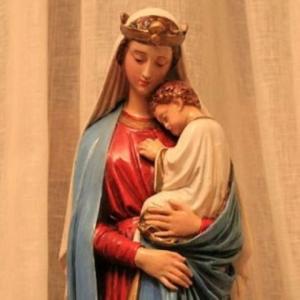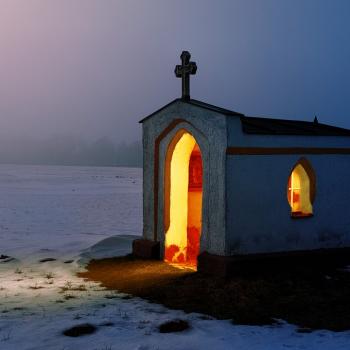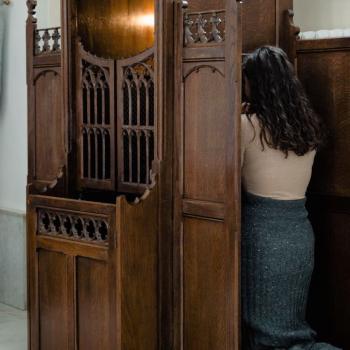Can thinking about Jesus’ mother, Mary of Nazareth, help women relate more closely to her? I was leaving Mass on Mothers’ Day when I overheard a woman saying that she had never been able to relate to Mary, Jesus’ mother. I started thinking about the many statues of Mary I have seen over the years. Mary is serious, draped in blue and possibly holding a cherubic Jesus in her arms. In some paintings, she looks mercifully down at “us.” She is perfect. Because she is without sin and looks perfect, it is difficult to imagine her dealing with a toddler, with conflict, or with much of daily life in her day and ours.
I think of these perfect images as “Mary, Queen of Heaven.” We direct prayers for the intercession of Mary, Queen of Heaven, when we recite the rosary. We honor this Mary when we pray the “Hail, Mary”.
In my own mind, Mary of Nazareth is Mary, Queen of Heaven, during her earthly life. She faced innumerable challenges and could only have achieved her later status in heaven by being strong, believing in herself, trusting in God, and responding creatively to various obstacles.

Mary in the Gospels
We first meet Mary of Nazareth in the gospels of Matthew and Luke, chapters 1 and 2. Recall that the Gospels or “good news” originally were oral announcements. Jesus’ followers preached about his great works, his death, miraculous resurrection and ascension, and his forgiveness of sins. Early believers thought that Jesus’ second coming was imminent, so initially they did not worry about recording this information in writing.
As time passed, however, the followers realized that they needed to create permanent written accounts of Jesus’ life, death, resurrection, and ascension. While the gospels are likely longer narratives of these events, they were never intended to be biographies. We only have short accounts of Mary’s life and actions here and there and gaps about which we have unanswered questions.
Mary of Nazareth’s Pregnancy and Experiences in Bethlehem
Scholars believe that Nazareth was a small town in the days of Jesus, Mary, and Joseph. We know from Scripture that Mary conceived Jesus by the Holy Spirit (Luke 1:31). The rest of Nazareth was not aware, however, of her pregnancy’s divine origin. I imagine that she was the subject of gossip because she had either conceived the baby with Joseph prior to their marriage or she had had an affair with another man. Saying that God was the father of her child probably would have gone over as well as it would today. An unusual pregnancy at the age of twelve would have been overwhelming, but gossip may have increased the stress. Most women can identify with being the subject of gossip. How would Mary have responded?
The census described in Luke, chapter 2, means that Joseph and Mary traveled from Nazareth in Galilee to Bethlehem in Judea (Luke 2:4). Bethlehem is significant because the heir to King David was to be born there. The couple traveled about sixty miles to arrive in Bethlehem. Though artists often portray Mary riding on a donkey, this detail cannot be found in Luke. Given that Mary gives birth soon after her arrival, she may have walked the entire distance in her ninth month, which would have taken great physical and emotional strength!
According to the Gospel of Matthew, the Magi visited Jesus, Mary, and Joseph. Luke tells that shepherds did as well. In dreams, God told the Magi not to tell King Herod where the child was and explained to Joseph that he, Mary, and the baby must flee to Egypt.
Joseph and Mary of Nazareth Fled King Herod
Mary and Joseph may have walked to Egypt with Jesus (Matthew 2: 13-15) at which point Joseph needed to find a livelihood. Had he brought the tools he used for carpentry? Mary and Joseph would have found other people with whom to associate. They had no place to live and shared many of the concerns of modern refugees. Mary would have needed to use all her skills to manage day-to-day life in another culture.
Would Mary have heard of Herod’s decision to massacre the boys in Bethlehem while they were in Egypt (Matthew 2:16-18)? If so, she surely did upon their return. Imagine processing the reality that so many parents had lost sons while Herod was seeking her own son. Living with this truth would also have required trust in God and emotional strength. Upon returning to Galilee, Mary, Joseph, and Jesus settled in Nazareth where they needed to start all over again.
Jesus Remained in His Father’s House
The Scriptures tell us that Jesus stayed in the Jerusalem Temple rather than rejoining his parents after their Passover journey to the city (Luke 2:41-52). Luke says that initially, his parents thought Jesus was among their family and friends. Subsequently, Joseph and Mary returned to Jerusalem and found Jesus in “his Father’s house” after three days of looking. What did their friends and family think about this unusual turn of events? Mary and Joseph do not seem like the type of couple who would lie and say that he was lost. Luckily upon returning, Jesus obeyed his parents.
We do not hear more about Joseph after the Passover Temple story. Did he die while Jesus was in his teens? Was he alive throughout Jesus’ life? We do not know. If Mary had to live as a widow, however, she was put in a difficult spot. Joseph’s work as a carpenter suggested that he might not inherit any land from his forbearers. If Joseph was to inherit land, however, it could have come to Mary through Jesus. If not, she was dependent on other people’s generosity to sustain herself and Jesus. Again, this would have been challenging.
Jesus Came to Nazareth and was Rejected
Luke tells the story of Jesus’ visit to the synagogue in Nazareth (Luke 4: 16-30). Jesus read a passage from Isaiah that refers to the prophet who would receive God’s spirit and anointing. He then said, “Today this scripture passage is fulfilled in your hearing.” At first, those listening were amazed, but then they noted that this was Joseph’s son and asked him to perform the works he had done elsewhere. He said that prophets are not welcome in their native place and made other references to great prophets of the Scriptures. He clearly associated himself with these other prophets which angered the Jews present. They consequently drove Jesus out of Nazareth.
I can imagine that as soon as Jesus was gone, all the anger and questions would have been directed at Mary (and Joseph if he was still alive). “Who is your son that he can speak as if he is one of the great prophets? Did you teach him to think this way? Do you think he is a prophet?” Mary likely faced mixed reactions from neighbors as Jesus traveled and did and said various unexpected things throughout his ministry.
Mary of Nazareth, Queen of Heaven
When I think of Mary of Nazareth, I imagine a resourceful, strong, loving woman who likely faced many challenges yet trusted in God: a miraculous pregnancy; the long trip to Bethlehem, Egypt and back; and the need to defend Jesus’ unusual behavior; the worry and sorrow of his life and death; and possibly the status of a widow. If she was able to make it through all of these things as well as the stresses of daily life, her life was much more like our own than we might think, despite the centuries in between. I think that the “Mary of Nazareth, Queen of Heaven” statue would have a wrinkled face; weathered skin; loving, compassionate eyes; and simpler clothing. She would be the type of person many of us would like to befriend, consult with and ask for help.
I believe in both the portraits of Mary of Nazareth and Mary, Queen of Heaven. After serving God so faithfully, God brought her up to heaven and gave her an exalted place. I think that many of us can relate more easily to Mary of Nazareth because we are on our own earthly journeys. We pray that we can join Mary someday in Heaven.

















